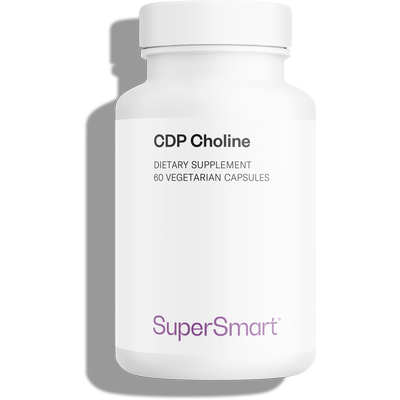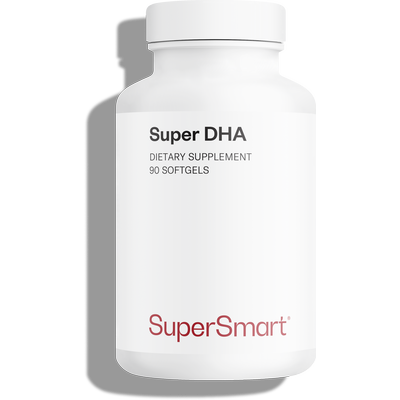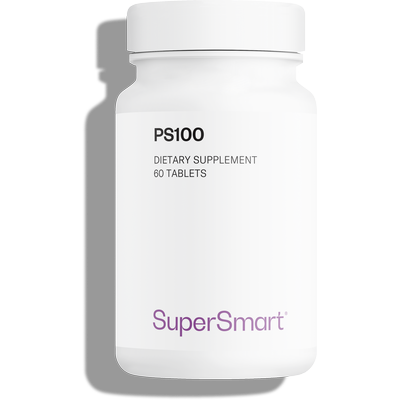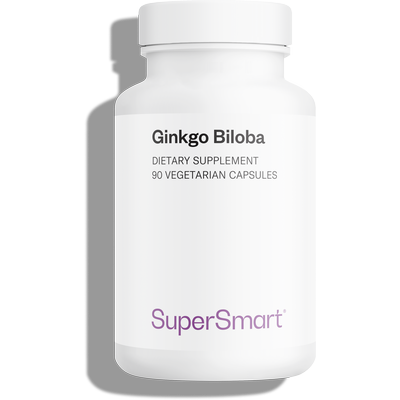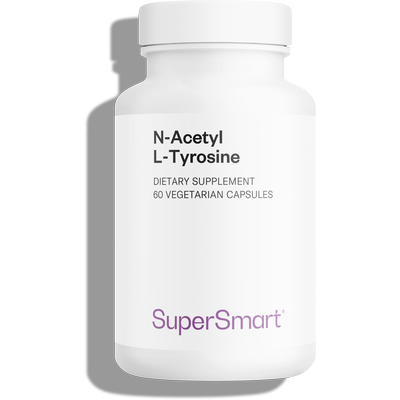16-02-2015
Put the brakes on age-related cognitive decline with these effective brain-boosting supplements!
 Ageing of the brain is not inevitable - taking popular or state-of-the-art nutrients can protect brain cells from age-related damage and stimulate cognitive function.
Ageing of the brain is not inevitable - taking popular or state-of-the-art nutrients can protect brain cells from age-related damage and stimulate cognitive function.
‘Cognitive function’ encompasses memory, attention, language, executive functions, spatial and visual processing, perception, concentration and intellectual functions such as decision-making and problem-resolution. It supports all our thought, action and communication processes.
Cognitive decline, which according to some experts starts from the age of 45, does not affect all these functions in the same way, at the same stage. Those which rely on general knowledge acquired over the years seem to be relatively unaffected, while in some people, those based on cognitive processes (memory, attention, speed of processing) often start to deteriorate earlier.
Acting via a number of routes, nutrient and phytonutrient supplements can provide real support for disorders ranging from mild cognitive problems to degenerative diseases such as Alzheimer’s.
The substances described below work by:
-
- Increasing production of acetylcholine (a neurotransmitter associated with memory and learning) and blocking the action of acetylcholinesterase (which degrades acetylcholine),
- Supporting the mitochondria in producing energy,
- Preventing oxidative damage,
- Boosting oxygen supply to the brain.
Ensure an adequate supply of macro- and micro-nutrients to the brain
-
- Omega-3 polyunsaturated fatty acids and in particular DHA - the most abundant fatty acid in the brain and a key promoter of neurogenesis - need to be consumed in sufficient quantities in order to confer their neuronal anti-inflammatory effects and ensure healthy fluidity in nerve cell membranes. In addition, recent studies have clearly demonstrated that combining omega-3 with alpha-lipoic acid slows cognitive decline 1.
- Minerals and trace elements - zinc, selenium and iodine - must also be ingested on a daily basis from the diet or from supplements.
- Intake of certain vitamins is particularly important for reducing cognitive decline:
-
o vitamin D3because low levels significantly damage proteins in the brain, alter glucose metabolism and result in mitochondrial changes2,
o vitamin Cbecause it promotes synthesis of noradrenaline and dopamine and because it ‘recycles’ vitamin E,
o vitamin E (tocopherols et tocotrienols3),
o B group vitamins (B1, B3 and in particular, B6, B9 and B12 because they prevent accumulation of toxic homocysteine),
o Beta-carotene for its antioxidant effects.
-
- Red berry extracts (Goji, cranberry, Tart Cherry4…) for their potent antioxidant effects in the brain,
- Curcuma, and in particular, curcumin, for its neuro-protective effects against oxidative damage5and for reducing and eliminating beta-amyloid deposition 6,
- Green tea (EGCG) for its ability to neutralise free radicals involved in brain ageing,
- Bacopa which inhibits acetylcholinesterase activity, boosts nerve impulses in the brain and helps repair damaged neurons.
- Ginkgo biloba and/or Taxifolin (dihydroquercetin) both of which improve cerebral microcirculation, as well as cognitive capacity, memory and concentration. Taxifolin, for example, produced a 70% improvement in memory in patients with cerebral circulation problems and in 60% of cases, it increased concentration and the index of intellectual activity. Gingko also acts as a cerebral antioxidant and anti-inflammatory
Choose recognised acetylcholine-boosters
Acetylcholine is an essential messenger of the nervous system. A number of substances can increase its internal production or inhibit acetylcholinesterase activity, so protecting levels of this major neurotransmitter.
Phosphatidylcholine is the primary component of neuronal membranes. It constitutes 30% of the dry weight of the brain, is essential for cell membrane fluidity and integrity and ensures the repair and maintenance of nerve and brain cells. It crosses the blood-brain barrier and transports glucose to nerve cells. CDP choline (cytidine 5-diphosphocholine) is another exceptionally bioavailable form of choline, found in the lipids that make up cell membranes and acetylcholine. Rapidly absorbed, it supports the natural production of a number of neurotransmitters (noradrenaline, dopamine and acetylcholine), facilitates communication between neurons and helps maintain memory and cognitive function.
Glycerophosphocholine (alpha-GPC) is converted on ingestion into phospholipids and choline. It stimulates overall brain function by increasing production of acetylcholine and phosphatidylcholine and is therefore useful in combatting cognitive problems, primarily early-stage senile dementia. In addition, it may be thought of as a nootropic, increasing adaptability to life’s demands by facilitating motivation and decision-taking and in particular, by improving cognitive and neurosensory processes as a whole.
Phosphatidylserine, like phosphatidylcholine, is part of the phospholipid group. An essential lipid component of brain cell membranes, it maintains their flexibility and permeability. It helps increase neurotransmitter receptor sites, promotes acetylcholine production and improves cerebral glucose metabolism. In older people supplemented with phosphatidylcholine, it improved memorisation of information, and visual and numerical memory7. The optimal dose is 300mg a day, for a minimum of six months.
DMAE (dimethyleaminoethanol) is a precursor of acetylcholine. It has a significant effect on the central nervous system, supporting and stimulating cognitive function by helping to maintain emotional and behavioural equilibrium.
Take advantage of the latest-generation substances
They can prevent brain ageing, reduce the progress of diseases affecting brain function and improve memory. The best-known supplements are undoubtedly acetyl-L-carnitine, alpha-lipoic acid, PQQ and CoQ10.Acetyl-L-carnitine (or its ester form, N-acetyl-L-carnitine) prevents the effects of brain ageing and protects neurons from oxidative damage. It increases acetylcholine production and stimulates mitochondrial energy production by encouraging the elimination of mitochondrial toxins. It improves nerve transmission by maintaining healthy synaptic function. A meta-analysis shows it improves memory and slows age-related cognitive decline. In addition, it supports emotional well-being and social behaviour in older people.
Sodium R-lipoate, a sodium salt of R-alpha-lipoic acid, has much higher biovailability than R-alpha-lipoic acid itself. With greater stability and solubility in the aqueous phase, it is more easily absorbed, enabling rapid achievement of plasma concentrations 10-30 times higher than those possible with pure R-alpha-lipoic acid. It increases acetylcholine production, prevents brain ageing, improves memory, reverses cognitive dysfunction and protects age-associated neurodegeneration.
PQQ (Pyrroloquinoline quinone) increases the number of mitochondria, thus improving production of ATP (energy) in the brain. The brain uses more energy than any other organ in the body and is totally dependent on its energy supply. In addition to this energy-boosting role, PQQ is also remarkable for its ability to protect brain cells from oxidative damage and neurotoxicity induced by toxins such as mercury. It improves memory test performance and interacts positively with the brain’s neurotransmitter systems.
In older people, supplementation with 20mg a day of PQQ improved their scores in cognitive tests, especially when combined with 300mg a day of CoQ10. This combination can therefore be used to improve mental status and quality of life, and to help delay or prevent age-associated cognitive impairment.
Coenzyme Q10 and/or its analogueidebenone have been widely studied in relation to treating age-related neurodegenerative disease. Recent studies have demonstrated that relatively high-dose supplementation with CoQ10 improves spatial learning, reduces oxidative damage and delays early senescence and should therefore be considered for individuals presenting with symptoms of cognitive decline8.
And finally, focus on these highly-promising new substances
Gastrodia elata extract, standardised to 98% gastrodin (a polyphenol) may promote certain neuro-regenerative processes by mobilising neuro-protective genes and improving synaptic plasticity, according to studies conducted on mice. What’s more, this compound is also known to have anti-inflammatory and antioxidant effects and to enhance blood flow in the brain.Magnesium threonate is a particularly bioavailable form of magnesium which can cross the blood-brain barrier. Recent animal studies suggest it increases synaptic density and thus improves cognitive function and capacity for memorisation. Even at very advanced stages of Alzheimer’s disease, it can also reduce toxic beta-amyloid plaques in the hippocampus and frontal cortex, so extending life expectancy to a modest degree. 9.
Homotaurine is a natural-source organic compound found in some algae. Recent studies have highlighted its neuro-protective effects in the hippocampus, a specific region of the brain responsible for memorising and learning10. It combines with beta-amyloid proteins, inhibiting the formation of neurotoxic aggregates which lead to the dysfunction and potential death of brain cells. Taking homotaurine will thus reduce memory loss, inhibit cognitive decline and protect brain cells from premature ageing.
Luteolin removes excessive levels of inflammatory cytokines in the brain, such as interleukin-6 and interleukin 1b, by acting on microglial cells. Luteolin supplementation thus helps maintain cognitive function, particularly memory and learning
Huperzine A is a natural alkaloid extract of the plant Huperzia serrata, used in traditional Chinese medicine. It promotes nerve cell growth and inhibits acetylcholine degradation by blocking the action of the enzyme acetylcholinesterase. It improved memory, cognition and behaviour in 58% of supplemented Alzheimer’s patients.
Uridine-5’-monophosphate (UMP) is recognised for its ability to stimulate axon growth, stabilise nerve cell membranes and increase acetylcholine production. It is therefore used in the preventation and treatment of neurological problems including Alzheimer’s disease.
L-pyroglutamic acid is an amino acid that protects brain cells. It supports cognitive function and learning while stimulating memory and concentration. It plays an important role in amino acid circulation in the brain and confers its protective effects primarily by eliminating excess glutamate from the brain and by regulating its transport.
Pterostilbene is a substance found naturally in certain berries (blueberries, grapes) which is chemically similar toresveratrol, a polyphenol from the stilbene group with a proven neuro-protective effect and ability to reduce lipid peroxidation13. It may also be up to four times more bioavailable than resveratrol with a longer half-life. In general, it improves concentration and short- and long-term memory and, according to a study conducted on mice, it may - as a result of its cerebral anti-inflammatory potential - protect against Alzheimer’s disease and age-related cognitive decline.
Ecklonia cava, and in particular, the phlorotannins it contains, can cross the blood-brain barrier. Studies14 have demonstrated that it increases acetylcholine concentrations in the brain, undoubtedly by inhibiting acetylcholinesterase. Another study found it reduced beta-amyloid plaque formation in the brain - responsible for memory problems in old people - by 40%.
Andrographis, more specifically an extract standardised to contain a high level of andrographolides (ParActin®), significantly improves memory and reduces cognitive impairment associated with spatial performance. Studies have shown it reduces hyperphosphorylation of Tau proteins, which stabilise microtubules and are abundant in the brain. Dementia can develop when these become defective and are no longer able to properly fulfil this stabilising role. In mice treated with ParActin® for four weeks, an increase was noted in the generation of new neurons.
Also worth mentioning are vinpocetine which improves oxygen supply to the brain and cellular glucose absorption and berberinewhich inhibits acetylcholinesterase and thus prevents acetylcholine from being degraded too quickly. 15.
-1 Shinto L, Quinn J, Montine T, Dodge HH, Woodward W, Baldauf-Wagner S, Waichunas D, Bumgarner L, Bourdette D, SilbertL, Kaye J. A randomized placebo-controlled pilot trial of omega-3 Fatty acids and alpha lipoic Acid in Alzheimer's disease. J Alzheimers Dis. 2014 Jan 1;38(1):111-20. doi: 10.3233/JAD-130722
-2 Keeney JT, Förster S, Sultana R, Brewer LD, Latimer CS, Cai J, Klein JB, Porter NM, Allan Butterfield D. Dietary vitamin D deficiency in rats from middle to old age leads to elevated tyrosine nitration and proteomics changes in levels of key proteins in brain: Implications for low vitamin D-dependent age-related cognitive decline. Free Radic Biol Med. 2013 Jul 18;65C:324-334. doi: 10.1016/j.freeradbiomed.2013.07.019
-3 Mangialasche F, Solomon A, Kåreholt I, Hooshmand B, Cecchetti R, Fratiglioni L, Soininen H, Laatikainen T, Mecocci P, Kivipelto M. Serum levels of vitamin E forms and risk of cognitive impairment in a Finnish cohort of older adults. Exp Gerontol. 2013 Dec;48(12):1428-35. doi: 10.1016/j.exger.2013.09.006. Epub 2013 Oct 7..
-4 Kim DO1, Heo HJ, Kim YJ, Yang HS, Lee CY. Sweet and sour cherry phenolics and their protective effects on neuronal cells. J Agric Food Chem. 2005 Dec 28;53(26):9921-7
-5 Experimental Biology Conference, Washington DC, April 17-21, 2004
-6 Journal of Alzheimer's Disease, vol. 3, 703-717, doi:10.3233/JAD-2009-1080
-7 Gindin J, Novikov M, Kedar D et al. The effect of plant phosphatidylserine on age-associated memory impairment and mood in the functioning elderly. Geri¬atric Institute for Education and Research and Dept of Geriatrics, Kaplan Hospital, Rehovot, Israel, 1995.
-8 Ritu A. Shetty, Michael J. Forster, Nathalie Sumien Coenzyme Q10 supplementation reverses age-related impairments in spatial learning and lowers protein oxidation, AGE October 2013, Volume 35, Issue 5, pp 1821-1834
-9 Li, W., Yu J., Liu Y., Huang x., Abumaria N., Zhu X., Huang X., Xiong W., Ren C. , Liu X. G. , Chui D., and Liu G. Elevation of Brain Magnesium Prevents and Reverses Cognitive Deficits and Synaptic Loss in Alzheimer’s Disease Mouse Model. J Neurosci, 2013. 33(19): p8423-41
-10 Analyse Post-hoc d’une phase 3 (78 semaines) d’une recherche nord-américaine sur des patients atteints de la maladie d’Alzheimer (intensité de la maladie : légère à modérée) et âgés de 50 ans ou plus
-11 Jang S, Dilger R, Johnson R. "Luteolin Inhibits Microglia and Alters Hippocampal-Dependent Spatial Working Memory in Aged Mice". Journal of Nutrition, 2010; 140 (10): 1892 DOI: 10.3945/jn.110.123273.)
-12 Tsai FS1, Cheng HY, Hsieh MT, Wu CR, Lin YC, Peng WH. The ameliorating effects of luteolin on beta-amyloid-induced impairment of water maze performance and passive avoidance in rats. Am J Chin Med. 2010;38(2):279-91.
-13 Porquet D, Casadesús G, Bayod S, Vicente A, Canudas AM, Vilaplana J, Pelegrí C, Sanfeliu C, Camins A, Pallàs M, Del Valle J. Dietary resveratrol prevents Alzheimer's markers and increases life span in SAMP8. Age (Dordr). 2012 Nov 7.
-14 Myung CS1, Shin HC, Bao HY, Yeo SJ, Lee BH, Kang JS. Improvement of memory by dieckol and phlorofucofuroeckol in ethanol-treated mice: possible involvement of the inhibition of acetylcholinesterase. Arch Pharm Res. 2005 Jun;28(6):691-8.
-15 Bhutada P, Mundhada Y, Bansod K, Tawari S, Patil S, Dixit P, Umathe S, Mundhada D. Protection of cholinergic and antioxidant system contributes to the effect of berberine ameliorating memory dysfunction in rat model of streptozotocin-induced diabetes. Behav Brain Res 2011 Jun 20;220(1):30-41
Order the nutrients mentioned in this article
Further reading
28-08-2019
Though many people are not aware of choline, it is actually recognised as an essential nutrient by the prestigious US National Academy of Medicine 1...
Read more10-10-2016
In India, turmeric is used to treat a wide variety of ailments including gastrointestinal problems, inflammation, headaches, infections and colds. It is turmeric’s curcuminoid content,...
Read more28-06-2017
As the control centre of the central nervous system, the brain has to deal with a constant flow of data, processing millions of bytes of...
Read more© 1997-2025 Fondation pour le Libre Choix
All rights reserved
All rights reserved
Free
Thank you for visiting our site. Before you go
REGISTER WITHClub SuperSmart
And take advantage
of exclusive benefits:
of exclusive benefits:
- Free: our weekly science-based newsletter "Nutranews"
- Special offers for club members only



